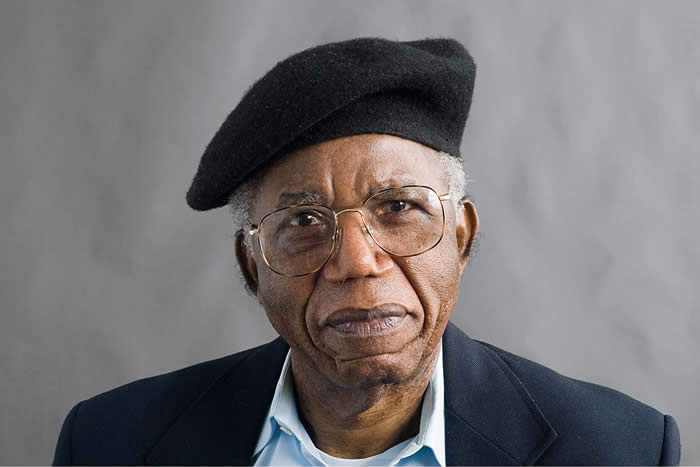In an interview with National Educational Television, NET in 1964, Veteran writer, Prof. Chinua Achebe, author of Things Fall Apart, No Longer at Ease and Arrow of God is interviewed by his fellow Nigerian writer, Prof. Wole Soyinka, and South African Novelist, Lewis Nkosi. The show is titled, ‘African Writers of Today’.
The interview was recorded at the Nigerian National Museum, Lagos.
The interview opens up by Chinua Achebe holding up a carved image and making references to the fact that every Igbo man owns one of these in his home. Soyinka interjects and they both discuss the image which turns out to be a carving of Ikenga, a symbol of manhood in Ibo society.
Lewis asks that they both sit and start off with the main interview.
Lewis then goes ahead to talk about Chinua Achebe’s two books, Things Fall Apart and No Longer at Ease.
Read Also: Achebe’s Things Fall Apart gets another translation
Soyinka likens the spirit of Achebe’s character Okonkwo from the novel Things Fall Apart to that represented by the carving. Achebe says he poured the essence of the aggressiveness and showy masculinity, traditionally so admired by the Ibo society into Okonkwo, and had his character’s ultimate downfall represent the shortcoming of a culture which places a premium on brute intransigence.
They discuss Okonkwo, the main protagonist in the book, Things Fall Apart, Achebe labels him as a true Igbo man who is successful through and through. He goes on to define his Masculinity and how it affects his society while fielding questions from Lewis and Soyinka.
Lewis Counters: Is one critical assessment of Achebe’s work – that in his books he deliberately attempts to avoid passing moral judgment – a true one?
Not at all, replies the novelist. Achebe says that while he presents a balanced picture of the Ibo society in Things Fall Apart, including its many admirable attributes (its music and art,”…the poetry of life, the simplicity… the communal way of sharing in happiness and in sorrow…”), and while he does not attempt to draw a moral lesson on every page, the total effect at the end of the book – the disintegration of his hero – illuminates a very strong moral position on the author’s part.
After dismissing an evaluation of his work as being “unrelieved competence” rather than “genuine artistic inspiration” by pointing out that Things Fall Apart was written as a single draft with no polishing, Achebe goes on to discuss the influences which have shaped his artistic life.
He speaks of the village, of the colorful tribal festivals, and of the way the old people talked. Coming from his own background, he points out, his fiction is the result of direct observation, not research.
He also refers to the negative influence of Joyce Cary’s Mr. Johnson which angered him deeply when he was a student at the University College Ibadan.
Achebe also briefly discusses his recent trip to the United States, where he met with the Harlem Group of writers – among them Langston Hughes and John Killens – and with a number of white writers including playwright Arthur Miller; his strong opposition to “people preaching from a position of ignorance,” a position which, he claims, is characteristic of most present-day critics of African literature; and his new novel Arrow of God.
AFRICA TODAY NEWS, NEW YORK

